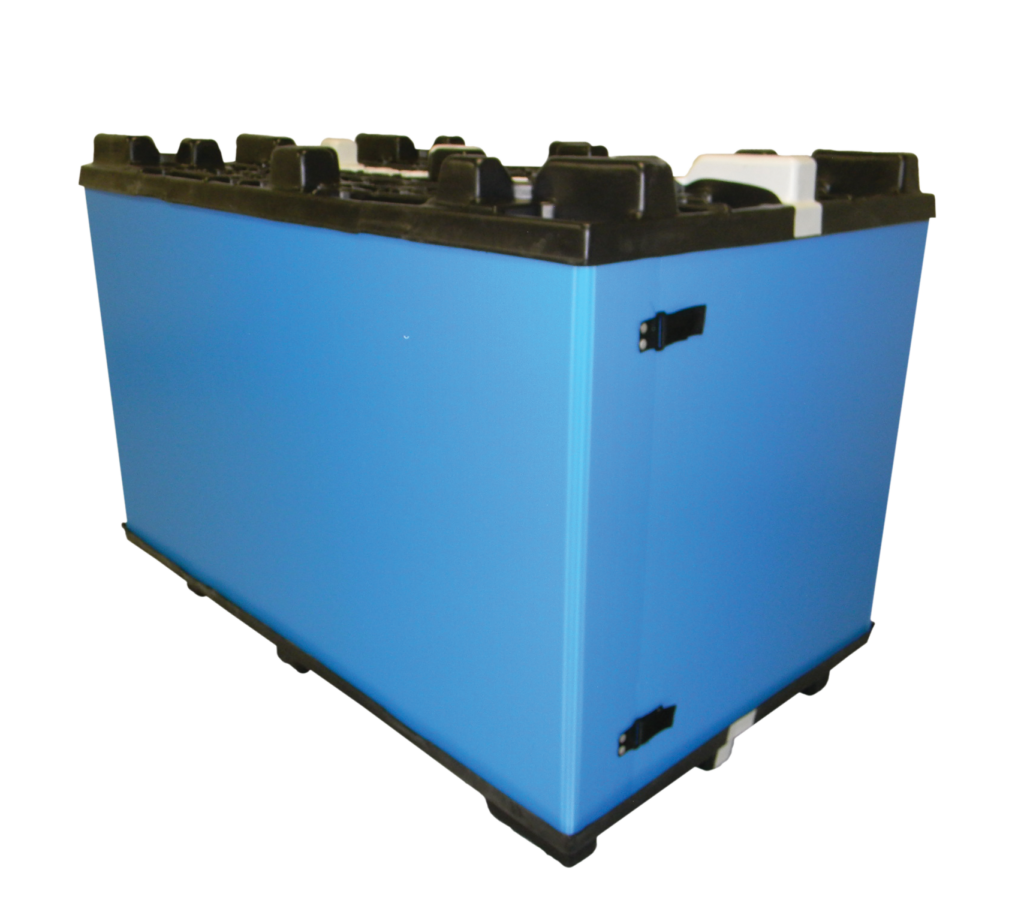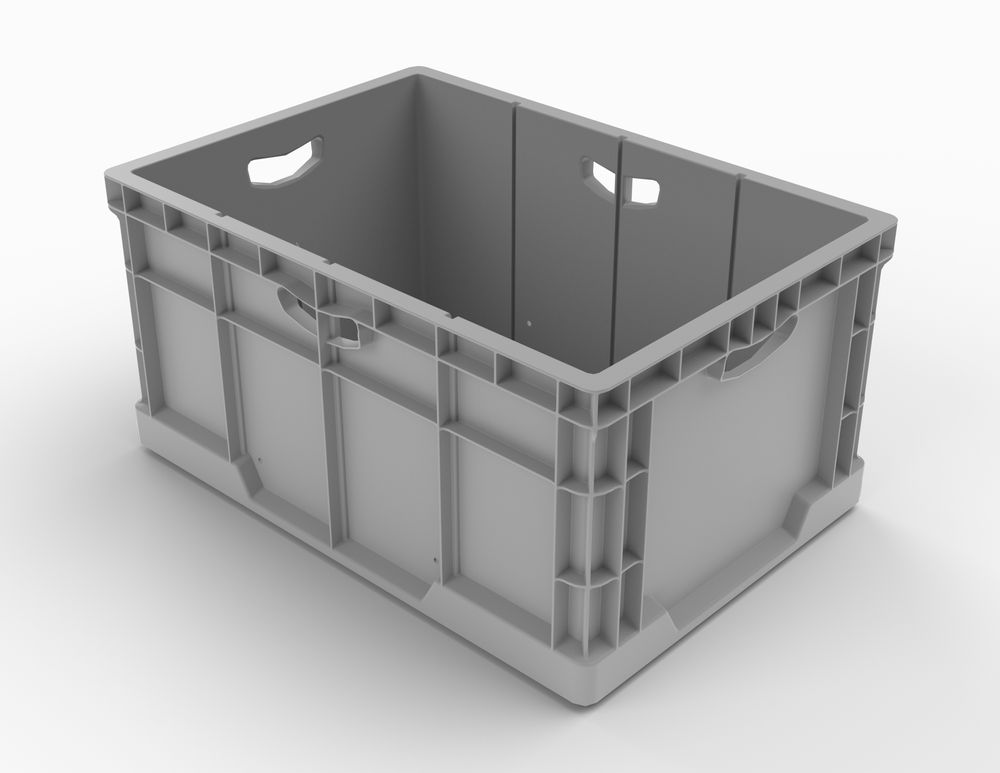In an age where consumer consciousness and environmental stewardship are at the forefront of purchasing decisions, businesses are increasingly turning to sustainable solutions to meet market demands.
Reusable packaging solutions, like the innovative products and systems offered by Universal Package, are leading this shift, presenting an opportunity for brands to enhance their processes and embrace eco-friendly practices.
This blog post delves into the intersection of sustainability and cost-effectiveness, exploring how businesses can leverage reusable packaging to strengthen their product transportation processes, and contribute positively to the environment.
With rising global awareness of the environmental impacts of packaging waste, companies are recognizing the importance of aligning their operations with long-term sustainability goals.
In addition to meeting regulatory requirements, eco-friendly practices and products also serve as a strategic move for businesses looking to differentiate themselves in an increasingly competitive marketplace.
One of the most pressing challenges facing companies today is choosing packaging that balances functionality with environmental responsibility. With many alternatives available on the market, reusable packaging stands out for its appeal both from operational and branding perspectives.
From the operational advantages to the positive ripple effects on brand reputation, this post will guide business owners, product manufacturers, supply chain managers, and sustainability coordinators through the myriad benefits of integrating reusable packaging into their business model. Join us as we unpack the transformative power of reusable packaging and other sustainable packaging options offered by Universal Package, paving the way for a greener and more responsible future in commerce.
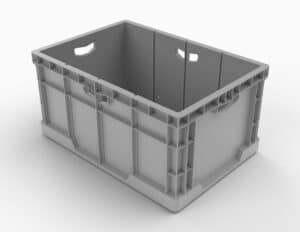
The Growing Importance of Sustainability in Packaging
The impact of packaging waste on the environment cannot be overstated. Traditional single-use packaging contributes significantly to landfill waste, ocean pollution, and resource depletion. These impacts have fueled a global call to action, with countries implementing regulations aimed at keeping packaging waste out of landfills and oceans.
For businesses across all industries, this shift towards sustainability presents an opportunity for innovation while simultaneously addressing societal concerns.
The growing importance of sustainable packaging is evidenced by the surge in eco-friendly options available on the market today. Embracing sustainability in packaging offers long-term cost benefits, such as reduced material expenses and increased efficiency, making it an investment in both the planet’s health and a company’s financial future.
What Are Reusable Packaging Solutions?
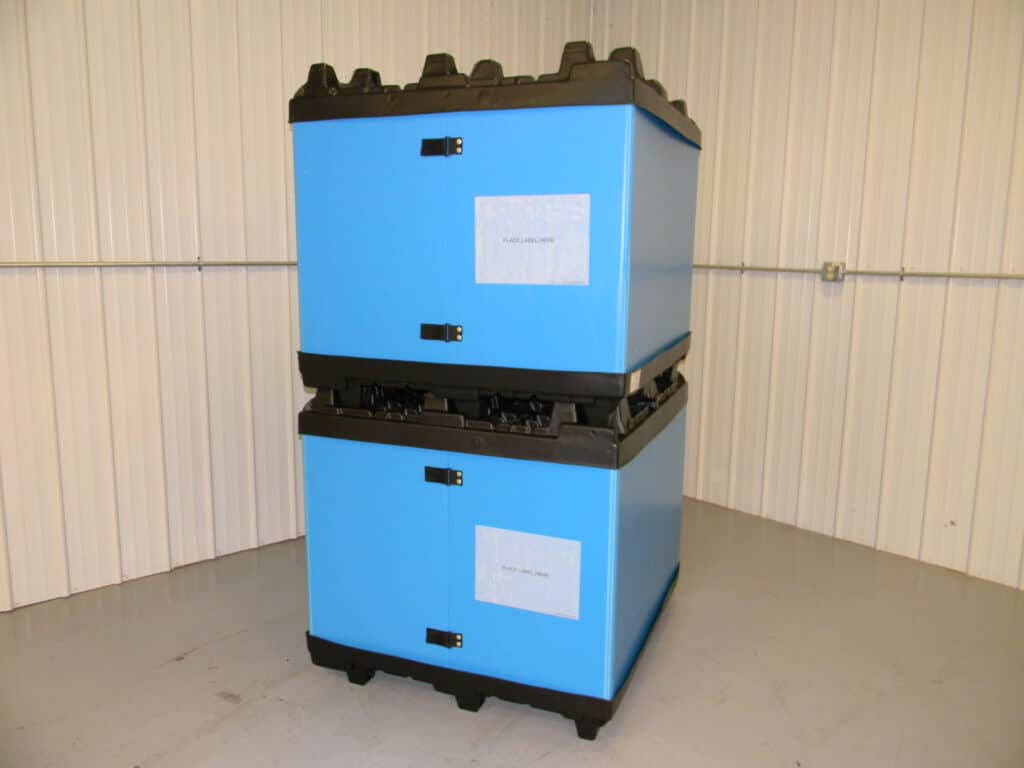
Reusable packaging solutions refer to packaging systems designed to be used multiple times before being recycled or disposed of. These solutions range from durable containers to modular systems that can be returned, refilled, and redistributed, all aimed at reducing waste in the packaging process.
Materials used for reusable packaging include plastic corrugated, steel, solid sheet plastics such as HDPE or UHMW, foam, etc. These materials are chosen for their longevity and ability to withstand multiple uses without significant degradation.
Formats vary from standard crates, bulk containers, totes and pallets to innovative custom packaging totes, cut and weld containers or sleeve packs, all crafted to meet the diverse needs of different products and industries. The emergence of custom reusable packaging designers has also provided businesses with the option to create tailor-made solutions that align specific requirements and brand identity.
Enhancing Brand Image with Reusable Packaging
Reusable packaging solutions serve as a powerful tool for businesses to establish themselves as eco-conscious brands. By opting for sustainable packaging options, companies communicate a commitment to environmental stewardship, which resonates with a growing segment of consumers who prioritize eco-friendly products and practices..
The choice of packaging design and materials acts as a tangible representation of a brand’s values, with reusable options showcasing a commitment to sustainability and innovation. This strategic move often results in a strengthened brand identity and a competitive edge in the marketplace.
Meeting and exceeding regulatory standards with eco-friendly packaging is a crucial aspect of integrating reusable solutions into your business.
With an increasing number of regulations focused on reducing waste and promoting sustainability, adopting reusable packaging can ensure your business stays ahead of compliance curves. This proactive approach not only aligns with legislative requirements but also demonstrates to your stakeholders a commitment to environmental stewardship.
Certifications and labels serve as a testament to a brand’s dedication to sustainability and can significantly enhance its reputation. They act as markers of credibility and assure consumers of the product’s eco-friendly attributes.
Certifications such as the Cradle to Cradle Certified™ or the B Corporation certification can increase consumer confidence and loyalty towards a brand, as they are external validations of a company’s sustainability efforts.
3 Challenges and Considerations When Switching to Reusable Packaging
Switching to reusable packaging solutions is not without its challenges. While the benefits are clear, businesses must carefully consider and address potential obstacles to ensure a successful transition. Here are three key challenges to keep in mind when adopting reusable packaging solutions:
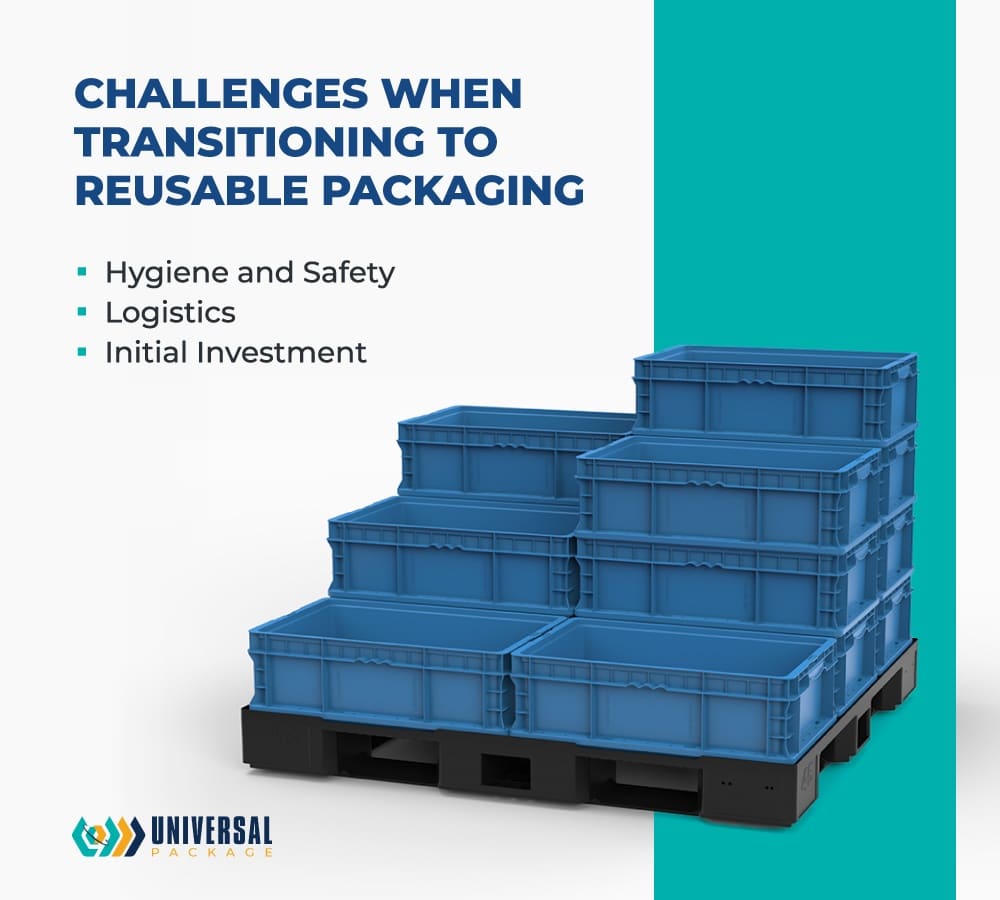
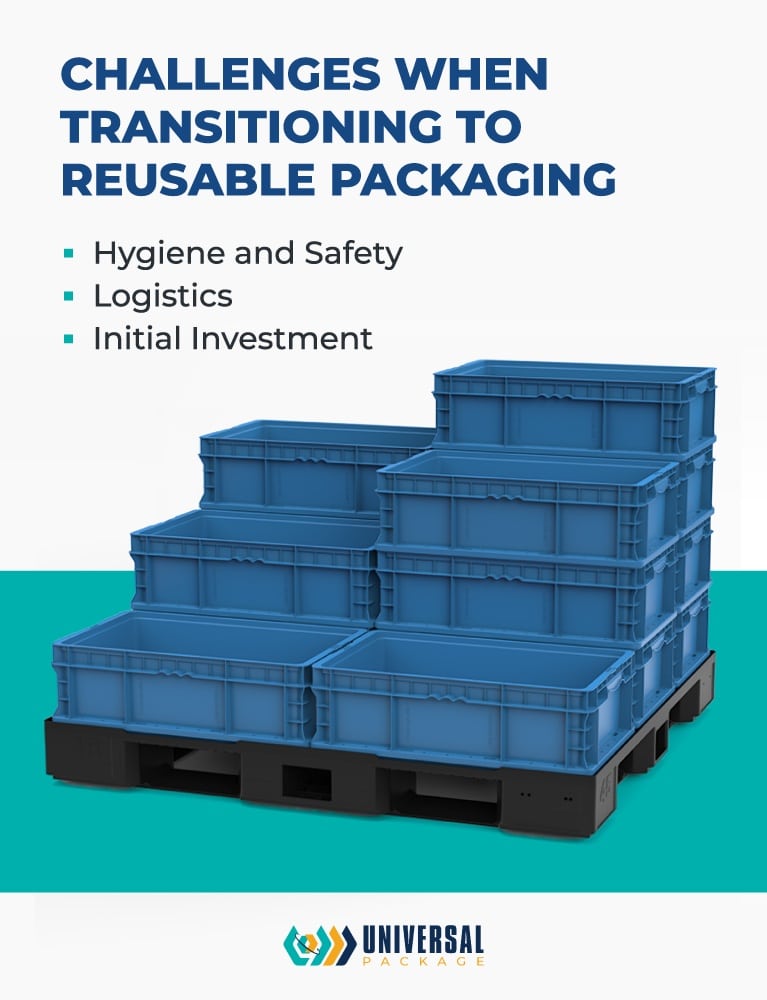
1) Hygiene and Safety
Addressing concerns about hygiene and safety is a primary challenge when switching to reusable packaging. Customers and regulatory agencies expect that products, especially those in the food and healthcare industries, maintain high standards of cleanliness. Reusable containers must, therefore, be designed to withstand thorough cleaning and sanitization processes without degradation.
2) Logistics
Managing the logistics of a reusable system also presents significant challenges. Businesses must create effective systems that enable the return and reuse of packaging. This might involve creating drop-off points, organizing return shipments, or establishing partnerships with facilities.
3) Initial Investment
Overcoming the initial investment and transition phase is another consideration. Transitioning to a reusable packaging model can require upfront costs for design, manufacturing, and system setup. Businesses must weigh these initial expenses against long-term savings and environmental benefits, ensuring the switch aligns with their financial and sustainability objectives.
Universal Package’s Sustainable and Reusable Packaging Options
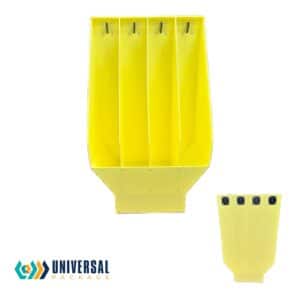
Universal Package has positioned itself at the forefront of sustainable packaging with a comprehensive range of reusable solutions designed to cater to diverse industry needs. These containers not only align with environmental sustainability goals but also offer the robustness required for repeated use.
Crafted from high-quality materials, Universal Package’s solutions are a testament to the company’s commitment to delivering packaging solutions that are both eco-friendly and economically viable.
Packaging solutions include, but are not limited to: plastic corrugated packaging, solid plastic sheets or die cuts, steel component racks and carts, dunnage, totes, foam packaging and assemblies and sleeve packs.
Universal Package further supports companies by providing customization services, allowing brands to enhance their packaging with logos, colors, and designs that resonate with their identity and values.
By offering these tailor-made solutions, Universal Package helps businesses transition to sustainable practices without compromising on their brand’s aesthetic or functional requirements.
How to Start Integrating Reusable Packaging into Your Business
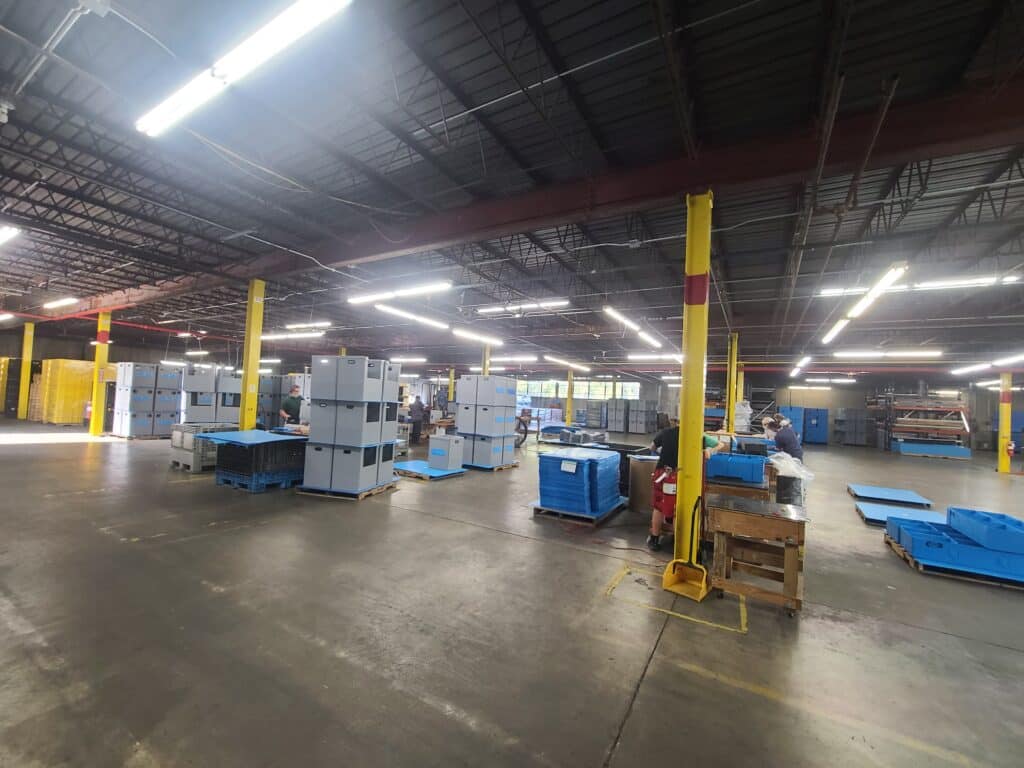
Conducting a packaging audit is the first actionable step for businesses interested in integrating reusable packaging solutions. This comprehensive review assesses current packaging practices, pinpoints areas for improvement, and identifies products that could be transitioned to reusable options.
By evaluating factors such as packaging volume, material usage, and waste management, businesses can develop a clear strategy for incorporating reusables effectively.
Partnering with a supplier, like Universal Package, who specializes in reusable packaging solutions is crucial for a seamless transition. These collaborations can provide access to expert advice, high-quality materials, and innovative designs tailored to specific industry needs.
Additionally, businesses should establish measurable sustainability goals and actively monitor progress to maintain momentum and demonstrate their commitment to environmental stewardship.
Yield Brand and Operational Advantages Today
Embracing reusable packaging solutions like Universal Package’s reusable solutions is not just a responsible environmental choice; it’s a powerful statement about your brand’s values and a smart business decision.
By choosing to integrate these durable and design-flexible options into your operations, you can enhance your reputation as an eco-conscious brand, streamline your supply chain, and potentially see significant cost savings over time.
Every step toward sustainability is a step towards building a stronger connection with your customers and setting your brand apart in an increasingly green-conscious market. Allow Universal Package to support your journey toward a greener future. Reach out to us today to explore how Universal Package’s products and services can revolutionize your packaging needs.

